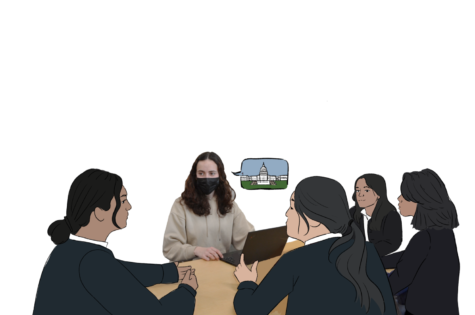Volman leads committee in Mock Congress
January 26, 2023

Photo by Zeina Nicolas
Ideas flew around the group of students sitting at the table, and Ronnie Volman (12) was quick to respond to each point of discussion with political insight and specificity. On Tuesday, January 3, Volman was leading a discussion with other students in her AP Government class about policy proposals related to the topics of their committee—Commerce, Science, and Transportation—that they could enact in their own classroom. The class was engaging in a Mock Senate, where students played the role of senators in a simulation of real American government.
During social science teacher Nic Spiess’s second period AP Government class, Volman was the chairperson of her committee, which meant she acted as the leader. Each member in her committee was tasked with drafting a bill that they would bring to their committee and, if passed, could later be proposed at a debate with the entire class.
“We wrote our bills on [topics like] building transportation and infrastructure, privacy for consumers and technology, liability for online platforms, and creating more facilities for transgender athletes,” Volman said.
Although the students were given some guidance, they ultimately determined the topic of their own bills and were responsible for writing the fine details. The bills themselves had to outline a plan for how the policies would be implemented and paid for.
“My bill was about the protection of individual consumer privacy,” Volman said. “It [addresses] tech companies buying and selling personal information and trying to make sure that the person’s data is protected.”
Volman said she found the concept of her bill interesting because of its relevance to her interests in two different areas: STEM and political advocacy.
“I’m interested in computer science and data science and anything tech-related,” Volman said. “I’m also interested in advocacy, so finding that intersection, that’s really interesting for me.”
As chairperson of her committee, Volman had various responsibilities related to leading discussions and making decisions about whether to advance bills or not. She worked with the other members of her committee to determine which bills needed changes, which ones to prioritize for the class debate, and so forth.
“My job was to lead the meetings that we had when we were drafting our bills and discussing our topics,” Volman said. “And then at the end, after we had all the bills submitted, I took a vote [with the other chairpersons] on which bills we want to actually send to the floor of the Senate.”
Then on January 5, the day of the Mock Senate floor proceeding, all bills were discussed and voted on to see which ones would pass. When Volman’s bill was brought up, students asked her questions to clarify certain details and improve the specificity of its goals.
“For example, [some questions that were asked included] how would the budget be allocated? Where would the budget come from (more specifically, which department)? What would the punishment be for violation of this legislation?” Volman said. “All of these questions helped me and other students better understand the scope of my bill and what my intentions were.”
Volman said her class was unevenly split across party lines, which had repercussions when it came to which bills were passed, amended, or vetoed entirely.
“We definitely had a lot more Democrats than Republicans just because [our teacher Mr. Spiess] let us choose which side we wanted to go to,” Volman said. “I don’t think he purposely wanted to make an even distribution.”
Regardless, ideological differences allowed for debates to occur over the bills, especially when it came to topics that are largely contested between party lines in real politics. Despite this, Volman said the conversation remained respectful.
“There were debates over bills that brought up topics such as LGBTQ+ diversity in books, climate-related concerns, and facilities for young transgender athletes,” Volman said. “The discourse was generally balanced and productive, with members from both parties raising questions and opinions that would help clarify the bill to lead into a final vote.”
One aspect of the simulated Congress that differed from real life was that there was little room for nuances in viewpoint when it came down to voting on bills. Students often put aside the intricacies of their own beliefs in order to align themselves with their party’s official (or unofficial) stances.
“If we’re voting on things, it’s expected that we’re going to vote on party lines and stick with more of a general consensus or general belief,” Volman said. “But at the same time, I can’t help but think that I don’t want to sink into the herd mentality.”
Although mainly sticking to her true political views, Volman said that in choosing a side, she had to align herself with certain stances that are not necessarily her own.
“I consider myself Independent, but when it comes to this, joining the Democratic Party aligns a lot more with my views than on the other side,” Volman said.
Volman said that she thought the most interesting part of the whole process was getting a first-person experience with the inner workings of American legislation, which cannot fully be explored in a traditional by-the-book lesson.
“With this project, we really have the opportunity to see how the actual congressional system works,” Volman said. “The workings of drafting a bill, seeing if they can get passed, discussing this in our committees, and just applying what we’ve been learning in our congressional unit to a real life situation [was interesting].”


